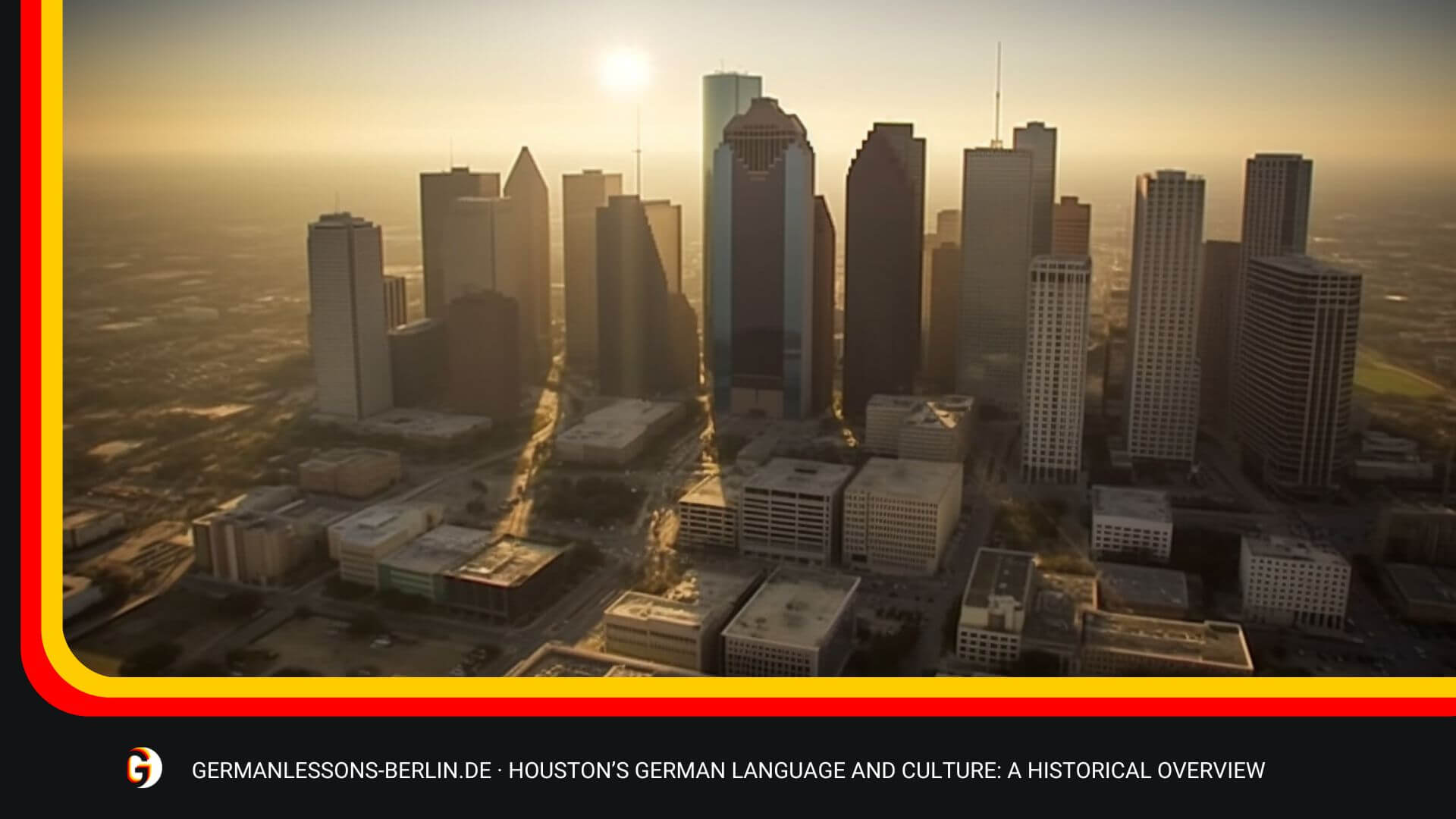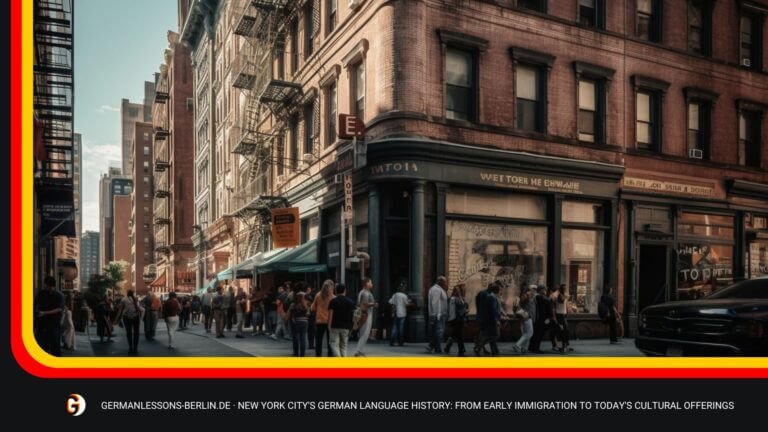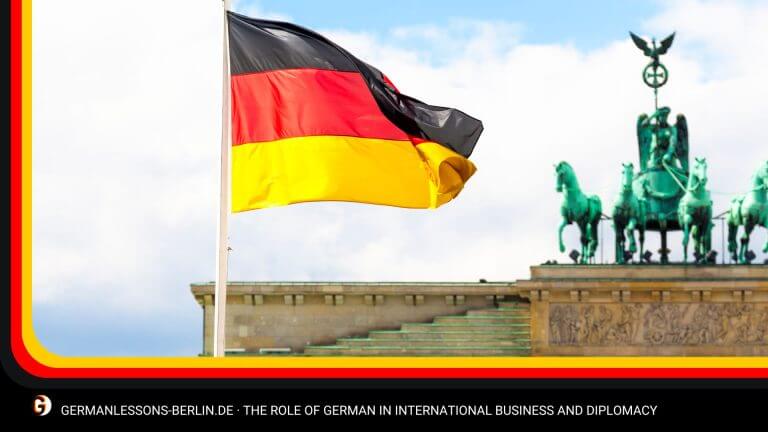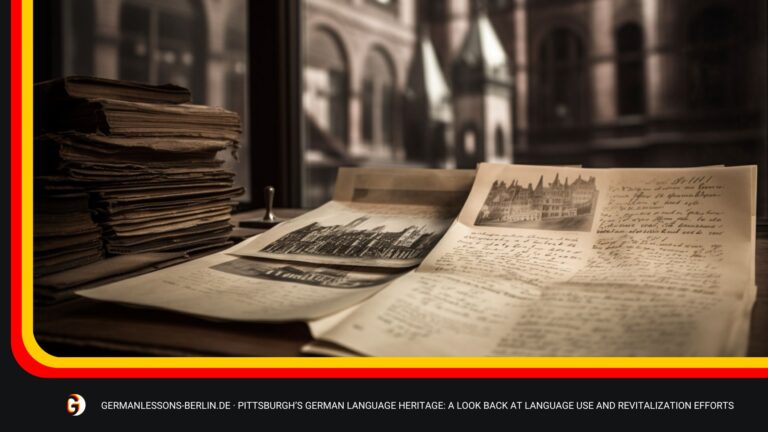Houston’s German language and culture have a long, rich history that is both fascinating and inspiring. For centuries, people of German descent have made their homes in Houston, bringing unique traditions, customs, and languages that continue to shape the city today. As a historian of Houston’s German Language and Culture, I am excited to explore this past with you as we uncover some of its lesser-known stories.
Paragraph Two: From the earliest days of settlement to current times, Houston’s German Language and Culture have played an integral role in shaping the city into what it is today. From early settlers who established churches for worship, education schools, and commerce businesses – all conducted in the mother tongue – to modern-day festivals celebrating traditional music and dance from Germany, each generation has left an indelible mark on our great city.
Paragraph Three: Ihat by exploring these stories together, we will gain a greater appreciation for how much influence our ancestors had on making Houston such a fantastic place to live. From embracing new technology while still holding onto cherished old-world values, many lessons can be learned about resilience and grit through understanding Houston’s German Language & Culture—a remarkable story!
Table of Contents
Overview Of German Immigration To Houston
German migration to Houston dates back over two centuries. During the 19th century, thousands of German immigrants arrived in Texas from Europe, seeking economic opportunities and religious freedom. Many settled in cities like Galveston and Houston, where communities increased due to the influx of settlers from other states and countries. These German-Houston immigrants brought their language, culture, customs, and traditions, which remain an integral part of life in Houston today.
The earliest German-American migrants largely came from Prussia, Bavaria, Saxony, Baden-Württemberg, and Hesse. They sought agricultural land to settle and grow crops or raise animals for sale. Others established businesses that ranged from blacksmiths to tailors and manufacturers of furniture and tools. As time passed, more Germans moved into larger towns such as Houston, where employment opportunities abounded—this period marked a significant growth in the number of German-speaking people living in the city. By 1890, it was estimated that there were approximately 10,000 German-born inhabitants.
Today, there are still many traces of this early German immigration visible throughout Houston: streets named after prominent figures such as Fannin Street; historical sites including churches and cemeteries; cultural institutions like museums dedicated to preserving the history of these pioneering individuals; restaurants that serve traditional dishes; festivals celebrating local heritage; schools teaching students about their ancestors’ contributions to society; organizations dedicated to promoting awareness about language proficiency among descendants of these original settlers—all evidence of how vital this population has been throughout Houston’s past up until now.
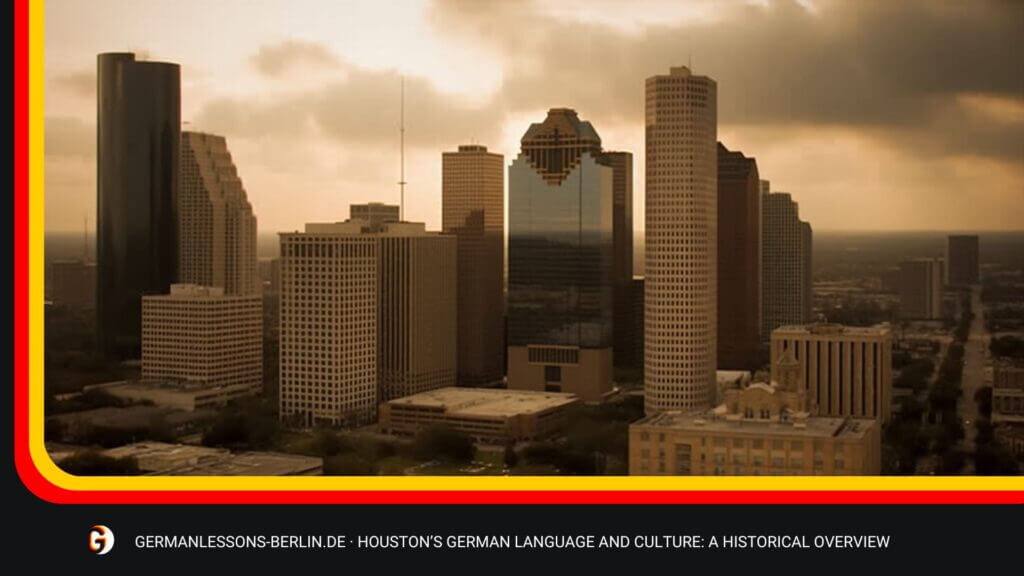
Development Of German-Speaking Communities In Houston
The German-speaking population of Houston had seen tremendous growth since the early 19th century when many immigrants arrived from Germany and Austria. As these immigrants settled in various neighborhoods throughout the city, they began establishing their communities. These German-speaking enclaves quickly developed into thriving societies with distinct cultures, languages, and customs that persist today.
These German-speaking neighborhoods experienced significant growth during the late 19th century due to new waves of migration from Central Europe and other parts of Europe. This influx of people led to an expansion of existing German-speaking communities and the emergence of new ones. The largest concentration was located near downtown Houston where many businesses catering to Germans were established, such as banks, shops, churches, and schools.
This period also saw an increase in language preservation efforts among the German-speaking community. Organizations such as the Deutscher Turnverein (German Gymnastics Club) were created to promote traditional culture through music, dance, and literature classes for children and adults alike. By educating its members on the importance of preserving their heritage, this organization helped ensure that future generations would continue to pass down their cultural legacy for years to come.
Houston’s German language and culture have been a vital part of the city’s history since its beginning; however, it continues to evolve even today, with new populations arriving from around the world bringing their unique perspectives. No matter what changes occur within these communities or how much time passes, one thing will remain constant: Houston’s commitment to honoring its rich German linguistic past while embracing its diverse present.
Preservation Of Language And Culture In Houston
Houston has a long and proud history of preserving its German language and culture. Houstonians have been committed to keeping their unique heritage for generations by maintaining language, customs, and traditions. Throughout the years, numerous organizations have emerged to protect this vital part of our city’s identity.
The first such organization was the Houston-based Texas German Society (TGS), established in 1982 by members of local German-speaking families who wanted to preserve their cultural heritage. TGS organizes events related to the German language and culture throughout the year, including classes on how to speak German and other activities designed to promote knowledge about Germany’s past and present. They also host annual festivals celebrating traditional aspects of life in Germany with food, music, and dancing.
Today, many more initiatives in Houston are dedicated to preserving the language and culture of Germans living here. From churches offering bilingual services for worshipers to schools teaching German as a second language, countless individuals are working together towards one common goal: ensuring that future generations can continue learning about Houston’s wealthy multicultural background. Through these efforts, we can ensure that our city remains vibrant, diverse, and connected to its roots for decades.
Educational Opportunities For German Speakers In Houston
Houston has long provided various educational opportunities for German-speaking residents and visitors. From language classes to tutoring sessions, many options are available for those who want to learn the language or enhance their existing skills.
The city offers numerous schools that offer courses in German. Additionally, some universities provide undergraduate and graduate programs in German as well. All these institutions enable learners to gain proficiency in speaking and writing the language with ease. As such, Houston is an ideal place for students from any country to study the language in depth.
For those looking for more personalized instruction, plenty of private teachers offer individualized lessons tailored to one’s specific needs. The following list provides an overview of the various options available in Houston when it comes to learning German:
- German-Speaking Schools – These schools specialize exclusively in teaching the German language and culture through comprehensive curriculums, including grammar, conversation, pronunciation, reading comprehension, and writing exercises.
- German Education Programs – Universities around Houston offer degree programs focusing on Germany’s history, literature, linguistics, and politics.
- German Language Courses – Many local community colleges offer specialized courses covering all aspects of the language, from beginner to advanced levels.
- German Language Classes – Several organizations dedicated to promoting multilingualism throughout Texas organize group classes led by experienced instructors at reasonable rates.
- German Language Tutors – Private teachers provide customized, one-on-one tuition, which can be organized online or face-to-face according to one’s preference and availability.
In short, whatever your goals may be – whether you’re aiming for mastery in conversational German or simply brushing up your knowledge before visiting Deutschland – Houston has plenty of resources available, allowing anyone interested in exploring its rich cultural heritage to do so with ease!
Expansion Of German Businesses And Industries In Houston
The expansion of German businesses and industries in Houston has been a significant part of the city’s growth over time. Companies have taken advantage of Houston’s favorable business climate from small family-run operations to multi-national corporations to establish successful ventures. Many large corporations, such as Lufthansa and Siemens, are now headquartered in Houston.
Houston is home to numerous German language schools and organizations that promote learning about German culture and language. These institutions often provide educational opportunities for those interested in learning more about the German people’s history, customs, and traditions. Additionally, these organizations foster an environment where individuals can practice their language skills with native speakers. Through these programs, students gain a greater understanding of Germany’s rich cultural heritage while gaining valuable linguistic abilities.
| Businesses | Industries | Economic Impact |
|---|---|---|
| Lufthansa | Automotive | $20 Billion |
| Siemens | Manufacturing | $10 Million |
| KPMG | Financial | $1 Billion |
Houston’s thriving German businesses and industries have tremendously impacted the local economy and its overall development. Significant investments from international firms have led to job creation, increased tax revenues for local governments, and improved infrastructure throughout the area. Furthermore, this influx of capital has allowed for new projects like research centers that advance technology-related fields such as artificial intelligence or aerospace engineering. The investment by foreign entities into various aspects of the Houston economy has helped boost economic activity across multiple sectors, including energy exploration, healthcare services, retail trade, and much more.
In addition to economic gains from German investments into Houston’s diverse range of industries, an intangible benefit comes with fostering solid ties between cultures through shared activities like language classes or festivals celebrating traditional music or foodways. This intercultural exchange creates mutually beneficial relationships which generate more profound levels of understanding between communities that would otherwise be separated by physical distance or ideological differences. By encouraging cross-cultural exchanges among different communities worldwide—including between Germans and Americans—, we can build more vital bridges that lead to greater peace worldwide.
Influence Of The German Community On Local Cuisine
Houston has a long history of German immigration and culture, particularly evident in the many restaurants serving delicious German-inspired cuisine. From traditional dishes like schnitzel to more modern creations such as bratwurst tacos, Houston’s German food scene is diverse and vibrant.
The influence of German immigrants on the local food culture can be seen in several ways. For instance, many popular dishes served in Houston have their roots in Germany: from sauerbraten to spaetzle, these classic recipes are still enjoyed by locals today. Similarly, several German-style restaurants serve authentic fare, including pretzels, wursts, and other favorites. The city also boasts numerous beer gardens which offer an array of imported beers alongside tasty pub grub.
German cuisine has become synonymous with comfort and indulgence for many people living in Houston. Whether you’re looking for a homecooked meal or something special at one of the area’s renowned eateries, it’s easy to find good eats inspired by Germany right here in town. With so much variety available, it is easy to see why German food is so beloved among Houstons residents – no matter your background!
Contributions To The Arts From Germans Living In Houston
The German community in Houston has made several contributions to the arts that have affected and shaped local culture. Their artworks can be seen throughout the city’s many galleries, from music to paintings, sculptures, photography, and more. In addition to producing works of art inspired by traditional Germanic themes and styles, they have often adapted them to fit with life in Houston. For example, some of the most famous pieces by German-Houston artists portray scenes from everyday life, such as street vendors or public parks.
German-American artwork also reflects how immigrants integrated into the broader Houston community while maintaining aspects of their homeland culture. This is evident through numerous pieces featuring images of American and German flags side by side or portraits depicting dual cultural identity. Through these works, viewers can get an insight into how Germans living in Houston forged new identities over time while still staying true to their roots.
This influence on art has been embraced wholeheartedly by locals who appreciate being exposed to different cultures within their city limits. As a result, several art galleries feature regular exhibitions showcasing Houston-German culture; this allows people to view unique pieces which are not only aesthetically pleasing but also serve as powerful visual reminders of multiculturalism in action. With its distinctive style, german-influenced art continues to enrich our lives here in Houston for generations to come.
Prominent Figures In The German Community
Houston has been a hub for German immigrants and their descendants since the early 1800s. During this time, several prominent figures have emerged from the Houston German community who have played an integral role in shaping the local culture and language. Here are four of these influential German Texans:
- Johann Friedrich Ernst was one of the earliest known Germans to settle in Houston after arriving in 1831. Ernst is credited with helping to preserve the city’s first German newspaper and even established a charitable organization to help new arrivals navigate their transition into life in Texas. He opened a general store that became popular among fellow German immigrants and served as a cultural center where they could share stories of their homeland.
- Julius Dreyspring was another key figure in Houston’s early days, appointed mayor by Colonel Augustus C. Allen during his tenure as President of the Republic of Texas in 1840. As mayor, he spearheaded several initiatives that improved infrastructure around the city, such as paving streets and constructing bridges over waterways. The Austin Roller Mills, built by Dreyspring himself, continue to remain operational today under different ownership and serve as a testament to his lasting legacy on the landscape of Houston.
- August Schleicher was an influential scientist at Baylor College (now Baylor University) who specialized in linguistics and made significant contributions to the field through his work with Indo-European languages. His theories helped expand our understanding of historical connections between various languages throughout Europe and Asia, making him one of the most critical scholars of European philology during his lifetime.
- Katherine Stinson was born in San Antonio but raised in Houston after her family moved there when she was just six. She went on to become one of America’s first female pilots. She gained international fame due to her daring stunts while performing aerial shows across North America during World War I era aviation exhibitions – including some right here in Houston! Her pioneering efforts laid the groundwork for generations of women pursuing careers related to aviation or aeronautics.
It is clear that many outstanding individuals have come out of Germany’s diaspora residing here in Houston throughout its history, leaving behind legacies that can still be seen today all around us; from street names honoring them to architectural projects they completed or institutions they founded or taught at – it is impossible not think about how much more prosperous life would be without having had those remarkable people grace our lives before us.
Festivals Celebrating The German Culture
Houston is home to a rich German culture, and the city celebrates this heritage with numerous festivals throughout the year. From Oktoberfest celebrations in October to family-friendly street fairs held annually, Houstonians have plenty of opportunities to experience German traditions firsthand. These events bring together people from all walks of life to enjoy music, food, and entertainment that capture the essence of Germany’s culture.
The annual Houston International Festival (HIF) is one such event that showcases Germany’s unique cultural offerings. HIF hosts over 1 million visitors every spring for an exciting weekend featuring traditional Bavarian dance performances, German cuisine tastings, authentic folk music concerts, and much more. The festival also includes workshops on language learning and engaging activities like beer stein races and bratwurst eating contests – perfect for those looking to celebrate their inner Teuton!
In addition to large-scale festivals like HIF, there are many smaller events around town dedicated solely to celebrating Germany’s vibrant culture. From holiday bazaars at local churches offering handmade crafts by community members to pub crawls highlighting some of Houston’s best breweries serving classic German beers, these occasions provide ample opportunity for folks interested in delving deeper into what makes Germany so unique.
So whether it be attending a massive international celebration or joining neighborhood friends for an intimate gathering centered around honoring the country’s customs – Houston has no shortage of ways for locals to commemorate Germany’s unique culture. It just takes a little exploration to find them!
Impact Of The Covid-19 Pandemic On Houston’s German Language And Culture
The COVID-19 pandemic has profoundly affected Houston’s German language and culture. The pandemic results have been felt in cultural preservation, educational impact, economic influence, and community outreach.
| Cultural Preservation | Educational Impact | Economic Influence |
|---|---|---|
| Decreased attendance at events such as Gemütlichkeit and Oktoberfest | Closure of German language schools such as Goethe Institute Houston | Decrease in demand for native German speakers in local industries such as oil & gas |
| Interruption to traditional German food festivals | Limited availability of online lessons & classes due to a lack of resources | Cancellation or postponement of travel opportunities for students wanting to study abroad in Germany |
| Closure of historic clubs like Deutsche Gesellschaft von Texas | Suspension or revocation of college credit programs offered by universities throughout the region | Reduction in support from sponsorships & donations from companies heavily involved with Houston’s German-speaking population |
The ramifications caused by the pandemic have significantly impacted the ability of Houston’s German-speaking communities to preserve their culture. Events that traditionally bring together people from all over the world who share an appreciation for this rich history are now few and far between, if not eliminated. Institutions dedicated solely to education about this unique dialect and its associated customs are either closed or struggling financially due to decreased enrollment resulting from safety protocols implemented during this time. Businesses reliant upon knowledge or skills acquired through learning German cannot benefit from these abilities since there is little need for them presently. Furthermore, organizations that rely on corporate partnerships no longer receive the necessary funding because many businesses need more money to afford it.
It is difficult to estimate how long Houston’s German language and culture sector will take to recover fully after being drastically altered by the Covid-19 crisis. While it is clear that progress must be made soon regarding preserving what makes this city so noteworthy, much work remains before we can once again experience these cherished aspects of our shared heritage without fear of putting anyone at risk.
Frequently Asked Questions
How Have German Immigrants Contributed To The Houston Economy?
German immigrants have had an extensive and ongoing impact on the Houston economy. German immigrants have made significant economic contributions to the city, from small businesses to large corporations, over many years. These same individuals also bring a rich culture that has helped shape Houston into the vibrant place it is today.
The first wave of German immigration began in the late 19th century as people sought new opportunities for work and family life away from their home country. As these immigrants settled in Houston, they opened businesses such as bakeries, butcher shops, grocery stores, saloons, and other establishments providing goods or services to their communities. In addition to providing employment opportunities, these businesses often became popular gathering places where locals could come together to share stories and enjoy each other’s company. This influx of hardworking entrepreneurs improved the local economy and enriched its cultural landscape by introducing aspects of German culture like music, food, language, and customs.
Today there are still numerous examples of thriving businesses owned by German-Americans throughout Houston. Across manufacturing and retail industries, these companies provide jobs for thousands of citizens while remaining true to their roots through initiatives like bilingual customer service or celebrating traditional holidays such as Oktoberfest. The presence of such organizations helps keep alive both the memory of past generations who immigrated here seeking a better future and those currently living in Houston who continue to make positive economic contributions within their community.
In summary, German immigrants have played an essential role in shaping the entrepreneurial spirit which drives much of Houston’s success today; without them, this city would be drastically different than we know today. It is clear that despite changing times, German immigrants remain a vital part of our thriving economy and contribute significantly towards creating a unique sense of identity among Houstonians across all cultures and backgrounds.
What Are Some Of The Most Popular German Cultural Festivals In Houston?
Houston’s vibrant German-American presence and culture can be experienced through its popular annual festivals. From Oktoberfest celebrations to traditional Bavarian music concerts, Houston provides numerous opportunities to locals and tourists alike to immerse themselves in the rich traditions of German culture. These events are an essential part of the city’s cultural identity, as they offer visitors insight into the history and customs of this unique community. Here are some of the most famous German cultural festivals that take place in the city:
– The Texas Sängerfest: This event is held annually at Miller Outdoor Theatre and celebrates choral singing from throughout Texas with performances from more than forty choirs. It features folk songs, classical works, spirituals, opera choruses, and show tunes – all sung in both English and German by thousands of vocalists.
– Oktoberfest Houston: One of the largest beer festivals in North America takes place each year at Hermann Park’s Pavilion Center, where you can sample delicious craft beers while enjoying polkas and other traditional dance music performed on stage by local bands. Visitors can also access authentic bratwurst and pretzels served by vendors, making it one of Houston’s must-see autumnal events.
– Maifest: This springtime festival brings out hundreds who celebrate Germany’s Maypole tradition with live music, food booths serving classic dishes like sauerbraten or kartoffelpuffer (potato pancakes), carnival rides for children – plus lots of beer!
Whether attending these significant events or exploring smaller gatherings such as Weinachtsmarkt (Christmas markets) or Fasching Karneval parades during Mardi Gras season, visitors will find plenty of ways to explore the city’s thriving German heritage scene in Houston.
How Has The German Language Been Preserved In Houston?
The preservation of the German language in Houston has long been an essential part of its rich cultural heritage. This is especially true given the city’s deep roots in German immigration and culture, which have existed since the mid-19th century. From dialects to traditional festivals and celebrations, here are some ways that Houston’s German language and culture have been preserved over time:
– Preservation of local dialects: Various regional German dialects have been kept alive in Houston for several generations. These include phrases such as ‘Guten Tag’ (good day) and ‘Auf Wiedersehen’ (goodbye).
– Celebration of annual festivals: Each year, Houston celebrates various popular German festivals like Oktoberfest, Karneval der Kulturen (Carnival of Cultures), Sommerfest (Summer Festival), etc., which allow residents to appreciate their German heritage even more deeply.
– Engagement with community organizations: Organizations such as The Texas Deutsche Sprach und Schulverein (German Language & School Society) help preserve the language through educational programs for adults and children.
– Publications on traditional customs: Various publications throughout Houston document the history of German immigrants who settled there and continue discussing traditional customs from abroad.
– Dedicated media outlets: Radio stations such as KNTH 1070 AM provide programming exclusively to preserve the language by broadcasting news updates about related events.
These initiatives are crucial in keeping elements from Germany’s past alive while celebrating its presence in Houston today. With these efforts combined, Houstonians can experience aspects of both old-world traditions and modern life simultaneously – giving them a unique appreciation for their ancestry and identity.
What Kind Of Educational Opportunities Exist For German Speakers In Houston?
Several options are available for those looking to learn or improve their skills. These include participating in formal classes and workshops, tutoring sessions, and joining local clubs and organizations.
Houston has many German language schools offering classes at all levels, from beginner to advanced. They range from intensive courses that cover multiple topics within the language to specialized programs focusing on particular areas such as grammar, speaking, writing, and reading. With these classes, students can work towards becoming fluent in German by increasing their vocabulary and pronunciation skills. Additionally, some schools offer cultural activities like cooking lessons that help learners understand the language and associated culture.
Tutoring services are also available in Houston for those interested in more personalized learning experiences. Tutors provide one-on-one instruction tailored to individual needs so learners can progress quickly and efficiently toward mastery of the language. Furthermore, several organizations host events throughout the year that feature social gatherings for native Germans living in the area where they can practice speaking with each other while preserving their heritage through conversation and storytelling.
In short, anyone who wants to learn German or become better at speaking it will find plenty of resources available in Houston. Whether attending a school or class, working with a tutor, or getting involved with local clubs and organizations, there are numerous ways to enhance one’s knowledge of the language while immersing oneself into its rich culture too!
How Has The Covid-19 Pandemic Impacted German Language And Culture In Houston?
The Covid-19 pandemic has significantly impacted the German language and culture in Houston. From the widespread disruption of educational programs to the closure of cultural centers, those interested in German heritage have been forced to adapt quickly or face challenges not anticipated at the start of 2020.
The pandemic particularly hard hit those interested in learning German as a second language; many classes had to move online, while some were canceled altogether due to decreased availability of resources such as tutors or instructors. Even if individuals can find digital opportunities for studying, there can still be issues related to technical difficulties or a need for more direct teacher feedback. Additionally, students often miss out on the unique social experiences associated with attending physical classes – something which cannot easily be replicated digitally.
In terms of preserving cultural traditions, the effects have also been felt strongly in Houston’s German community. Popular festivals like Oktoberfest have either been canceled entirely or postponed until much later in the year than usual. The same is true for smaller get-togethers involving local clubs and organizations dedicated to furthering understanding and appreciation for everything related to Germany and its people. Without these activities regularly occurring throughout the year, it becomes more difficult for members of this community, who may feel disconnected from their past when unable to celebrate together as they once did.
The Covid-19 pandemic has undoubtedly changed how we interact with the German language and culture here in Houston, but it doesn’t mean that our connection must suffer ultimately – far from it! With creative approaches put into practice both online and offline, there will hopefully come a time soon when we’ll be ready again to enjoy everything that makes up our city’s rich history surrounding this particular part of our identity.
Conclusion
Houston has a long and rich German language and culture history that continues to shape the city today. Over the centuries, German immigrants have been instrumental in building Houston’s economy, from its earliest days as an agricultural hub to its current status as one of America’s most populous cities. The vibrant community celebrates its heritage through popular festivals like Hermann Park Oktoberfest and Brazos Bend Beer Fest.
Preserving the German language is just as crucial as preserving cultural traditions. Programs such as the Goethe-Institut Houston offer courses for students to learn or brush up on their skills in speaking, reading, writing, and understanding the language. There are also plenty of other educational opportunities throughout Houston for those who want to become more immersed in this unique culture.
Despite being heavily impacted by the COVID-19 pandemic, many organizations continue to foster an appreciation for the German language and culture within Houston’s communities. From ongoing virtual events to new initiatives dedicated to strengthening ties between native speakers and newcomers alike, there are still plenty of ways for people living in Houston to explore Germany’s influence on their city. I am proud to be part of this effort that helps ensure future generations can appreciate all these hardworking immigrants brought with them when they arrived here over a century ago!
Some external resources are available to learn more about Houston’s German language and culture. The German Texan Heritage Society, the University of Houston’s German Program, and the German American Chamber of Commerce of the Southern United States celebrate and promote Houston’s German-American heritage. Additionally, the city hosts many German cultural events throughout the year, including the Houston Oktoberfest and the Christkindlmarkt. By exploring these resources and attending events, one can gain a deeper understanding of the historical and cultural significance of the German language and culture in Houston’s history.

